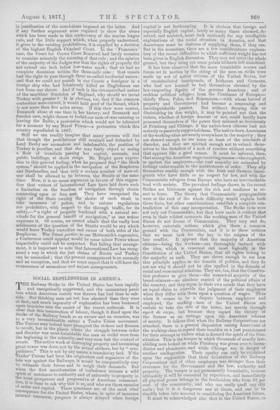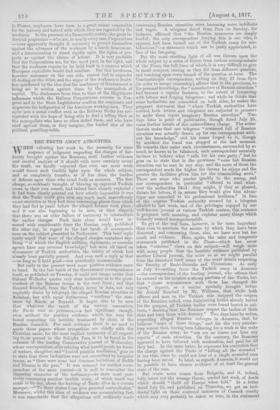SOCIAL RESTLESSNESS IN AMERICA.
THE Railway Strike in the United States has been rapidly and energetically suppressed, and the momentary panic into which American society was thrown has had time to sub- side. But thinking men are not less alarmed than they were at first, and much ingenuity of explanation has been bestowed upon inquiries into the causes of the recent outbreak. It is clear that this insurrection of labour, though it fixed upon the Strike of the Railway hands as an excuse and an occasion, was to a very inconsiderable extent a Trades Union movement. The Unions may indeed have prompted the stokers and firemen to revolt, but in the places where the struggle between order and disorder was most formidable the men on strike were from the beginning in the minority, and very soon lost the control of events. The active work of destroying property and terrorising great towns was done, not by the actual strikers, but by "sym- pathisers." This is not by any means a consolatory fact. If the Trades' Unions had been the originators and organisers of the late war against the Railways, it would be comparatively easy to estimate their forces and to weigh their demands. But when the first manifestation of turbulence arouses a wild spirit of resistance to authority and of animosity to property in the most prosperous and progressive of American communi- tees, it is time to ask why this is so, and who are these enemies of order and capital. These questions are of the most vital consequence for the United States, where, in spite of immense internal resources, progress is always delayed when foreign
capital is not forthcoming. It is obvious that foreign and especially English capital, lately so many times alarmed, de- ceived, and mulcted, must look anxiously for any intelligible explanations of the social situation in America, and that Americans must be desirous of supplying them, if they can. But in the meantime, there are a few considerations explana- tory of the recent difficulties to which sufficient weight has not been given in English discussion. They may not cover the whole ground, but they bring out some points hitherto left unnoticed. It has been observed that the more formidable masses and forces sot in motion by the rising of the men on strike were made up not of native citizens of the United States, but of unassimilated immigrants, of Irishmen and Germans, who had not learned to feel themselves elevated by the law-respecting dignity of the genuine American ; and of reckless political refugees from the Continent of Europe,— chiefly Slays, Poles, and Bohemians,—with whom hatred of property and Government had become a consuming and
inextinguishable passion. But without denying this or diminishing its duo weight, it may be pointed out that the rioters, whether of foreign descent or not, could hardly have possessed themselves of the power they misused so ferociously at Pittsburg and Chicago, if the native-born citizens had not actively or passively supported them. The native-born Americans of the working-class are nearly everywhere in the majority ; they are shrewd enough to see some at least of the mischiefs of disorder, and they are spirited enough not to submit them- selves to the dictation of a mob of rowdies without something that appears like a good reason. It must be inferred, then, that among the American wage-receiving masses—the employed, as against the employers—the vast majority are animated by feelings unfavourable to the maintenance of order. They ally themselves readily enough with the Irish and German immi- grants who have little or no respect for law, and with the Communistic refugees from Europe who have an irreconcilable feud with society. The prevalent feelings shown in the recent Strikes are bitterness against the rich and readiness to re- sort to force. The theory that Communistic propagandists were at the root of the whole difficulty would explain both these facts, bet other considerations establish a complete con- tradiction of this easy interpretation. The Strike riots were not only not Communistic, but they have made it evident that even in their wildest moments the working-men of the United States do not dream of Communism. They may and do, however, entertain notions which give them a common ground with the Communists, and it is to these notions that we must look for the key to the enigma of the late conflict. It appears that the majority of American citizens—being the workers—are thoroughly imbued with the idea, which is reasoned out most logically in the Constitution of the United States, that all rights belong to the majority as such. They are clever enough to see how this principle applies in the domain of politics, and they do not see why it should not be also applied in the domain of social and economical relations. They see, too, that the Constitu- tion professes to give them—the numerical majority of the bread-winners—an absolute control of the political affairs'of the country, and they argue in their own minds that they have an equal claim to override the judgment of their employers when they differ with them upon a question of wages. Thus when it comes to be a dispute between employers and employed, the working - men of the United States are certain to take the side of the latter, not merely through espeit de corps, but because they regard the victory of the former as an outrage upon the American scheme of society. It follows that when the Railway Corporations are attacked, there is a general disposition among Americans of the working-class to regard their troubles as a just punishment for their attempt to violate what is deemed the spirit of the Con- stitution. This is the temper in which thousands of usually law- abiding men looked on while Pittsburg was given over to incen- diaries and plunderers, and while Chicago was in danger of another conflagration. Their apathy can only be explained upon the supposition that their detestation of the Railway Corporations and of other employers was stronger than their reverence for the Government and the law, authority and property. The temper is not permanently formidable, because ultimately it will be corrected by experience, and immediately all physical power belongs to the freeholders who form GC per cent. of the community, and who can easily quell • any city mobs ; but it is a dangerous one at times, and one to be steadily taken into account in considering the American future.
It must be acknowledged also that in the United States, as in France, employers have been to a great extent responsible for the jealousy and hatred with which they are regarded by the workmen. In the presence of a Democratic society, the great in- dustrial proprietors—who are, in nearly every case, Corporations —have apparently thought it necessary to protect themselves against the advances of the workmen by a harsh demeanour, and a determination to stand rigidly upon the rights of' pro- perty as against the claims of labour. It is very probable that the Corporations are, for the most part, in the right, and that the workmen require to be held back in a manner which European capitalists would find needless. But this harshness, however necessary on the one side, cannot fail to engender ill-feeling on the other, and the anger of the workmen is doubt- less quickened by the idea that the machinery of Government is being set in motion against them by the monopolists of capital. The disclosures from time to time of the illegitimate influences which the Railway Corporations exercise in Con- gress and in the State Legislatures confirm the suspicions and aggravate the indignation of the American working-men. They eater into a social conflict such as the Railway Strike has pre- cipitated with the hope of being able to deal a telling blow at the monopolists who have so often defied them, and who have used against them, as they imagine, the loaded dice of the political gambling-table.



































 Previous page
Previous page